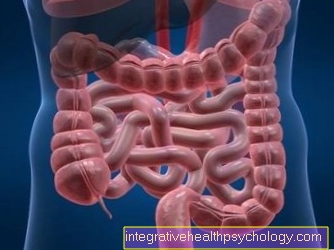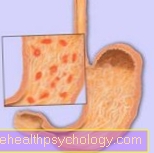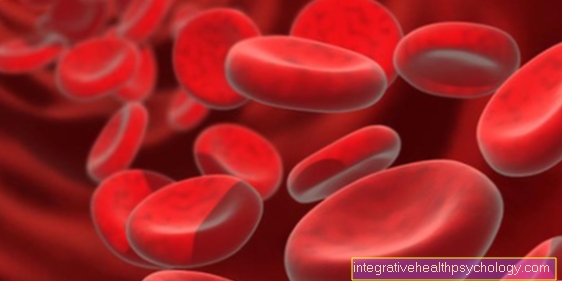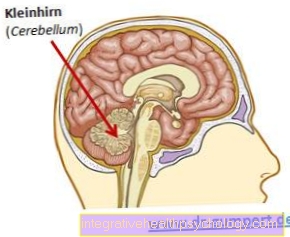Mesenteric artery occlusion
synonym
Mesenteric infarction, mesenteric artery infarction, occlusion of a vessel (an artery) that supplies the abdominal organs
English: mesenteric arterial thrombosis, acute mesenteric ischemia, mesenteric infarction
definition

(Mesentery: Mesentery around the abdominal organs, actually around the small intestine;
artery: Vessel, which oxygen-rich blood from Heart leads to the organs)
Under a Mesenteric artery occlusion one understands an occlusion of the lumen of the mesenteric artery. Humans have two such so-called mesenteric arteries, an upper and a lower. Both arise from the abdominal artery (aorta). The artery that originates further up is usually affected by the acute occlusion. Since these den Small intestine supplied with blood, this is also the organ that sustains the damage.
Summary
Under a Mesenteric closure one understands a blockage of an artery, which leads the blood into abdominal organs (here mostly small intestine). The most common causes are those who have been abducted Thrombi in question which mostly occurred after major surgerys arise.
The complaints slowly begin with stabbing pain in the abdomen that is difficult to localize. While the stomach is still soft at this stage, it later becomes as hard as a board and shows defensive tension. The patient is extremely bad.
The diagnosis is made on the basis of the symptoms, blood counts and actual observation of the incident through an operative intervention. Such a vascular occlusion can have dire consequences: the affected, undersupplied section of the intestine can die, the toxins pass into the blood and it can up to Blood poisoning come.
The therapy consists in the removal of the Clot or even the removal of the affected section of the intestine.
To prophylaxis Patients receive anti-coagulant medication after major surgery.
This measure is essential because the mortality rate with this mesenteric artery occlusion is 90%. Usually the diagnosis is only made in the final stages - hence the high mortality rate.
causes
Come as the most common cause Embolisms in question - a blood clot is carried into this abdominal artery and closes the lumen. The clot can also arise directly on site, or the lumen can close due to trauma.
Symptoms

The symptoms can be divided into stages:
In the initial stage,
which covers a period of about one to two hours, the person concerned complains about a diffuse, knife-prick-like pain in the abdomen. The abdomen still feels soft, and the intestinal peristalsis is also without any pathological findings. The patient is obviously doing badly. The heart can too Arrhythmia exhibit. The tricky thing about such a closure is that after this stage the symptoms seem to improve. This is followed by that
Terminal stage,
in which the bowel movements cease, the abdomen becomes hard and shows defensive tension. The cause of this is a Intestinal obstruction due to the lack of blood supply to the small intestine. Also bloody diarrhea can occur.
consequences
The consequence of such Arterial occlusion In the abdominal cavity, the worst case scenario is death of the intestine. The most commonly affected artery supplies the small intestine with oxygen-rich blood. If this is now closed or constricted, only an insufficient amount of blood reaches its destination, the small intestine.
This then dies. The released toxins can lead to a Blood poisoning lead, so that the removal of the intestine is inevitable.
diagnosis

The diagnosis is mainly based on the symptomswhich the patient delivers. But changes in values can also be detected in the blood count.
The vessels can be visualized with the aid of imaging. If necessary - in case of suspicion or in case of doubt - an operative measure is necessary.
therapy
The Aim of therapy it is to remove the blockage, to restore the blood flow and thus to allow the intestine to be harmed as little as possible. The final therapy depends on the individual case. Different therapies are used depending on the stage. Removal of the clot may be sufficient, but removal of the dead section of the intestine may also be necessary.
prophylaxis
Dem Mesenteric artery occlusion is difficult to prevent. Since they usually occur after major operations, appropriate postoperative intervention in the body's own coagulation system is essential.
forecast
In the terminal stage, mortality is 90%because mesenteric artery infarction is often only diagnosed at this point.













.jpg)















